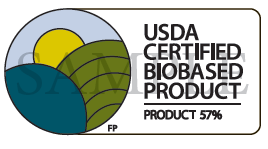 ASTM D6866 Measures Organic Carbon vs Total Carbon
ASTM D6866 Measures Organic Carbon vs Total Carbon
• ASTM D6866 looks at Total Organic Carbon and excludes Inorganic Carbon
• Carbonates are excluded from ASTM D6866 computations
ASTM D6866 was written for the US Department of Agriculture to provide a measure of renewable carbon to total organic carbon within carbon-containing solids, liquids, and gases. The term « biobased » is therein defined as « total renewable carbon to total ORGANIC carbon. »
Biobased Products Definition
As defined by the 2002 Farm Bill, biobased products are commercial or industrial products (other than food or feed) that are composed in whole, or in significant part, of biological products, renewable agricultural materials (including plant, animal, and marine materials), or forestry materials. The 2008 Farm Bill extended the definition of biobased products to include biobased intermediate ingredients or feedstocks.
Biobased products like writing papers, paints, insect repellents, plastics, liquid cleaners, diesel fuel additives, and floor tiles contain inorganic carbon in significant quantities. Since ASTM D6866, by definition, only takes into account total organic carbon, inclusion of inorganic carbon in the biobased content calculation will affect the accuracy of the measurement. It is important to know if the product submitted for ASTM D6866 testing has inorganic components so that correction factors will be applied during biobased content calculation. Biobased products with inorganic carbon that has little or no carbon 14 activity will have biobased content values that are too low if corrections will not be applied. Inorganic carbon in biobased products is usually present in the form of carbonates. However, not all carbonate-containing biobased products have sufficient amounts of inorganic carbon to affect the accuracy of the results. Products with high organic carbon content and low inorganic carbon content will generally not be affected by the presence of the latter. Those with very low organic carbon content, on the other hand, will be affected by even small amounts of inorganic carbon because the latter constitutes a significant portion of the product’s total carbon content. For products with inorganic carbon constituting more than 3% of the total carbon, the inorganic carbon must be excluded from the biobased content calculation. Thus, to ensure the accuracy of results, the lab must be informed if a product’s inorganic component concentration is sufficient enough to pose analytical concerns.
